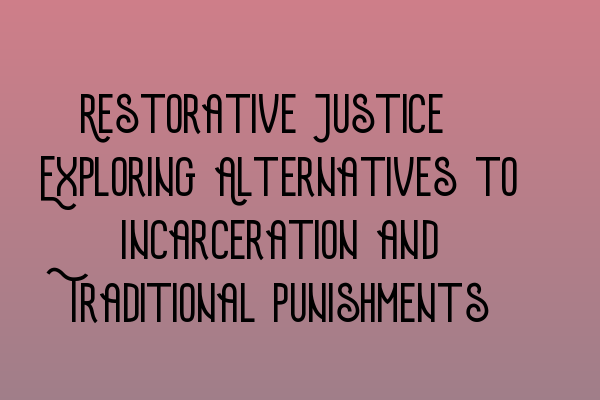Restorative Justice: Exploring Alternatives to Incarceration and Traditional Punishments
When it comes to criminal justice, incarceration and traditional punishments have long been the go-to methods of dealing with crime. However, in recent years, there has been a growing recognition of the limitations of these approaches and a shift towards embracing restorative justice as a more effective and meaningful alternative.
What is Restorative Justice?
Restorative justice is a philosophy and an approach to addressing crime that focuses on repairing the harm caused by criminal behavior. Rather than simply punishing offenders through incarceration, restorative justice seeks to involve all parties affected by the crime, including victims, offenders, and the community, in a process of dialogue, accountability, and healing.
This approach aims to address the underlying causes and consequences of crime, promote empathy and understanding, and foster a sense of responsibility and participation in the community. It recognizes that punishment alone does not always lead to true rehabilitation or deterrence.
A Shift in Approach
As society grapples with the myriad challenges posed by traditional punitive approaches, restorative justice is gaining traction as a viable alternative. Research has shown promising results, with lower recidivism rates compared to traditional methods of punishment. It offers a potential pathway to break the cycle of crime and create safer, more cohesive communities.
Restorative justice offers a range of alternative methods for addressing criminal behavior:
- Victim-Offender Mediation: In this process, facilitated by a trained mediator, victims and offenders come together to discuss the harm caused, explore the impacts, and work towards resolution and healing.
- Community Conferencing: Community members, including victims, offenders, and their respective supporters, gather in a safe and controlled setting to discuss the crime, its impacts, and collaboratively develop a plan to repair the harm caused.
- Restorative Circles: These circles bring together affected individuals, community members, and support networks to engage in facilitated dialogue, promote healing, and encourage accountability.
These methods prioritize the needs and perspectives of victims, while also aiming to address the root causes of criminal behavior and reintegrate offenders into the community in a meaningful way.
Benefits of Restorative Justice
Restorative justice offers numerous benefits over traditional punitive methods:
- Healing for Victims: Restorative justice gives victims a voice, an opportunity to be heard, and a chance to seek closure and healing in a supportive environment.
- Accountability and Responsibility: By involving offenders directly in the process, restorative justice holds them accountable for their actions, encourages understanding of the harm caused, and supports personal growth and rehabilitation.
- Community Engagement: Restorative justice facilitates community involvement, empowering individuals to play an active role in addressing crime and promoting a sense of safety and cohesion.
- Reduced Recidivism: Studies have shown that restorative justice practices are associated with lower rates of reoffending, indicating the potential for long-term positive impact.
Overall, restorative justice offers a holistic and inclusive approach to addressing crime that focuses on healing, accountability, and community well-being.
The Role of SQE Criminal Law & Practice Law UK
At SQE Criminal Law & Practice Law UK, we are dedicated to promoting a comprehensive understanding of criminal justice and exploring innovative approaches to legal practice.
To learn more about the Solicitors Qualifying Examination (SQE) and its format, take a look at our article “Demystifying the Solicitors Qualifying Examination Format.” This guide will provide you with valuable information to navigate the exam successfully.
If you are an entrepreneur in the UK looking to form a Limited Liability Company (LLC), our step-by-step guide “LLC Formation Made Simple: Step-by-Step Guide for UK Entrepreneurs” is a must-read resource. It covers the key considerations and legal requirements for forming an LLC.
For a comprehensive overview of business regulations in the UK, refer to our article “Business Regulations in the UK: A Comprehensive Overview.” This resource will help you navigate the legal landscape and understand the obligations and compliance requirements for running a business.
If you are aspiring to become a solicitor and are preparing for the SQE exam, our article “Preparing for the SQE Exam: Strategies and Resources for Success” will provide you with valuable tips and resources to enhance your preparation and achieve your goals.
Looking for additional support to accelerate your exam preparation? Check out our SQE workshops and webinars “SQE Workshops and Webinars: Accelerate Your Exam Preparation.” These interactive sessions are designed to enhance your understanding, address key concepts, and boost your confidence.
Conclusion
Restorative justice offers a transformative approach to addressing crime, emphasizing healing, accountability, and community engagement. As society embraces alternatives to incarceration and traditional punishments, it is crucial to acknowledge the potential of restorative justice in creating safer, more compassionate communities.
At SQE Criminal Law & Practice Law UK, we are committed to promoting restorative justice principles and exploring innovative legal practices to enhance the field of criminal law.
